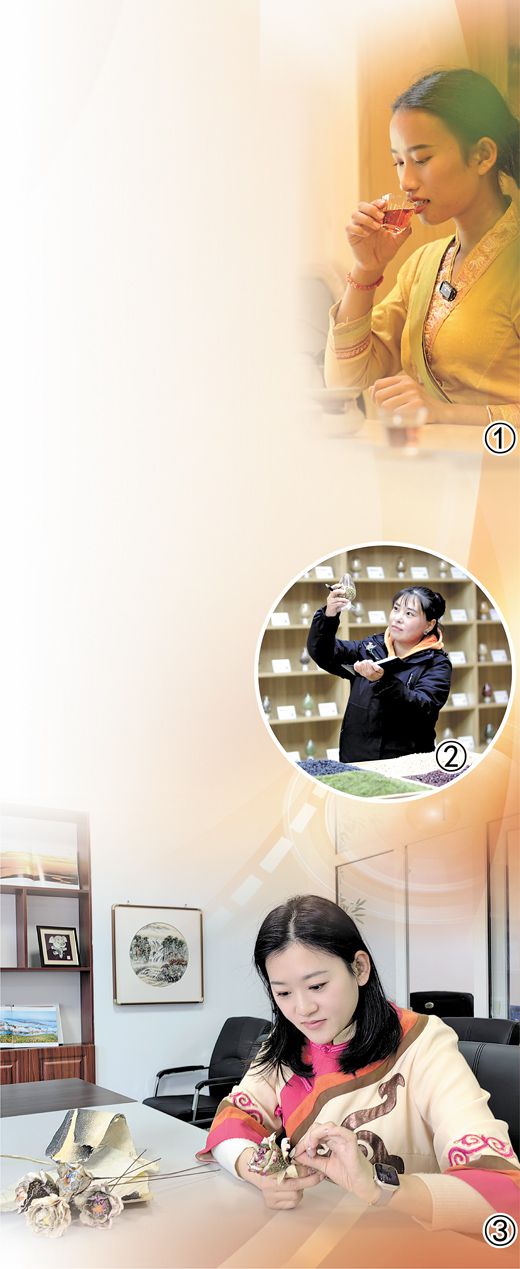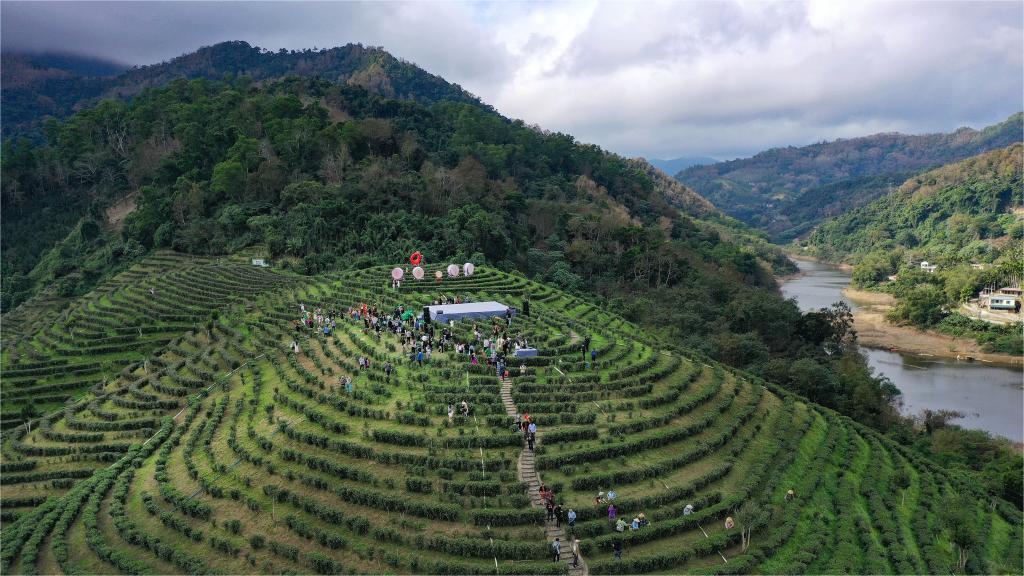Young Chinese devoted to protecting agricultural heritages
Many young Chinese have been devoting to the protection and inheritance of agricultural heritages, as China has advanced the protection of agricultural heritages in recent years, with various regions tapping into agricultural heritage resources, creating brands of characteristic agricultural industries, and promoting an excellent farming culture.
Wang Hulin, born in 1986, is a villager of Wangjinzhuang village in Shexian county, north China's Hebei Province. A rain-fed stone terrace farming system in the county was recognized as a Globally Important Agricultural Heritage System (GIAHS) by the Food and Agriculture Organization of the United Nations in 2022.
Since 2015, Wang has engaged in e-commerce in his hometown and promoted the rain-fed stone terrace farming system. However, he found that some terraced fields were abandoned over the past years.

①: Xian Jin performs tea art. (Photo/Ding Zhixiong)
②: Liu Yurong checks the quality of crop seeds. (Photo/Lu Haidong)
③: Cao Wenle works on a fish-skin handicraft. (Photo/Li Wei)
Wang established an agricultural cooperative in 2021 and initiated a plan to restart farming activities on abandoned terraced fields in 2023 to promote the protection and utilization of the rain-fed stone terrace farming system by pooling the efforts of villagers.
Last year, the cooperative newly cultivated over 200 mu (13.3 hectares) of abandoned terraces. Wang mulled over resuming the sound cultivation of abandoned terraced fields, such as raising funds by pre-selling millet, and enhancing the reputation of the terraced fields to promote their sustainable protection and utilization through methods like livestreams.
"Next, I plan to resume cultivating another 300 mu of abandoned terraces," Wang said.
Liu Yurong, born in 1987, is a member of the association for the protection and utilization of the rain-fed stone terrace farming system in the county. Liu has surveyed various old varieties of crops in Wangjinzhuang village and collected seeds from farmers. Liu has also tracked and recorded the crops in the experimental fields for three consecutive years.
The seeds of 171 old varieties of crops are now being preserved at a crop seed bank in the village, Liu said, adding that two rare old varieties of crops collected in the recent two years have been successfully bred.
Thanks to the joint efforts of local young people, the GIAHS in Shexian county is embracing renewed vitality.
Cao Wenle, born after 1995 in the Hezhe ethnic village of Zhuaji in Wusu township, Fuyuan city, northeast China's Heilongjiang Province, instructs students how to make fish-skin clothes at a fish-skin studio in the township.
In 2015, the fish culture system of the Hezhe ethnic group in Fuyuan city was listed as a nationally important agricultural heritage in China.
Under the influence of her mother, Pan Xiuhong, who is an inheritor of the provincial intangible cultural heritage of the all-fish banquet, Cao has become very attached to Hezhe culture since she was a child. She began to learn the craft of making fish-skin clothes when she was a middle school student.
After graduating from college, Cao worked in southern China. In July 2022, she returned to her hometown and became a staff member of the city's intangible cultural heritage protection center. That’s where she learned the craft of making fish-skin clothes.
"The craft of making fish-skin clothes is an important part of the Hezhe ethnic group's fishing and hunting culture. It reflects the long history of our ethnic group, and reflects the Hezhe people's life skills that have been passed down for generations," Cao said.
"In the past, I only had a smattering of knowledge about the craft, but I have learned a lot from inheritors, which has further fueled my love for our ethnic culture," she added.
Cao participated in the application for over 10 intangible cultural heritage items, involving fish-skin handicrafts, fishing customs, and traditional fishing tool making techniques, in 2023.
During the peak tourist season, she holds cultural promotion events at a folk custom exhibition center of the Hezhe ethnic group to tell Hezhe stories to visitors.
"It's the young people's duty to protect fishery resources and carry on the fish culture. I chose to return to my hometown, hoping to promote our ethnic culture," Cao said.
Cao has been researching on how to make fashionable fish-skin headwear and fish-skin handicrafts that cater to the young people's aesthetic tastes.
"While preserving our original culture, I hope to innovate. Attracting our peers and getting more people to understand and accept Hezhe culture is what we young people should do," she said.
Jingmai Mountain, located in Lancang Lahu Autonomous County, Pu'er city of southwest China's Yunnan Province, is known for its ancient tea plantations. Since the Pu'er ancient tea plantation and tea culture became a pilot system of GIAHS in 2012, Jingmai Mountain has seen improved road conditions and more homestay hotels. Recognizing this as an opportunity, Xian Jin, who was born in the 2000s, returned to Jingmai village in Jingmai Mountain to manage tea gardens based on encouragement from her family.
To gain more knowledge about tea, she worked at a tea house in Kunming, capital of Yunnan, and learned how to plant tea trees from tea farmers, and how to make tea.
To increase the value of tea leaves, Xian's family collaborated with several farming households to establish the first local tea cooperative, which purchases fresh tea leaves from farmers and sells processed tea leaves.
Xian is also involved in the daily operations of the cooperative. Every spring and autumn tea picking season, 28 households sell fresh tea leaves to the cooperative.
"Now, one household can earn more than 90,000 yuan ($12,676) by selling fresh tea leaves each year," Xian said.
Xian also wears the traditional costumes of the Dai ethnic group and introduces Jingmai Mountain's tea and culture through livestreams, garnering a large number of followers.
In September 2022, Xian hosted livestreams to sell tea leaves with her partner. During their first livestream, transactions of tea leaves reached 6,000 yuan.
The average turnover of tea leaves in each of her livestream now hits about 5,000 yuan. "Sales of tea leaves through livestreams account for 40 percent of my family's total," Xian said.
After the Cultural Landscape of Old Tea Forests of Jingmai Mountain in Pu'er was inscribed on the UNESCO World Heritage List in September 2023, Xian felt more motivated.
"I will put down roots here and watch ecological tea forests thrive," she said.
Photos
Related Stories
- China, U.S. extend MoU on preventing illegal importation of Chinese cultural artifacts
- School in S China's Guangxi integrates intangible cultural heritage into physical activities
- China's top procuratorate announces cultural artifacts, heritage protection cases
- Senior CPC official stresses protection, inheritance of cultural heritage
- Protection, inheritance of cultural heritage to be enhanced
Copyright © 2024 People's Daily Online. All Rights Reserved.









